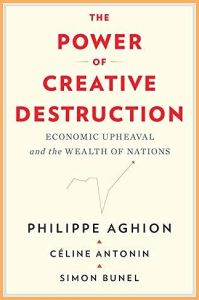
The Power of Creative Destruction
Economic Upheaval and the Wealth of Nations
Recommendation
This densely packed, academically styled book offers a contemporary and comprehensive analysis of creative destruction, effectively spelling out the policies and priorities that can maximize innovation in an economy. It provides a robust defense of some of capitalism’s tools, like property rights and intellectual property, while at the same time noting that innovative companies are good for social mobility and bad for corruption. Economists Philippe Aghion, Céline Antonin and Simon Bunel make an intelligent and balanced contribution to the literature on modern economies: how to make them thrive and what governments need to do to let that happen.
Summary
About the Authors
Philippe Aghion is a professor at the College de France and the London School of Economics. Celine Antonin is a senior researcher at the French Economic Observatory. Simon Bunel is senior economist at the French National Institute of Statistics and Economic Studies.








Comment on this summary